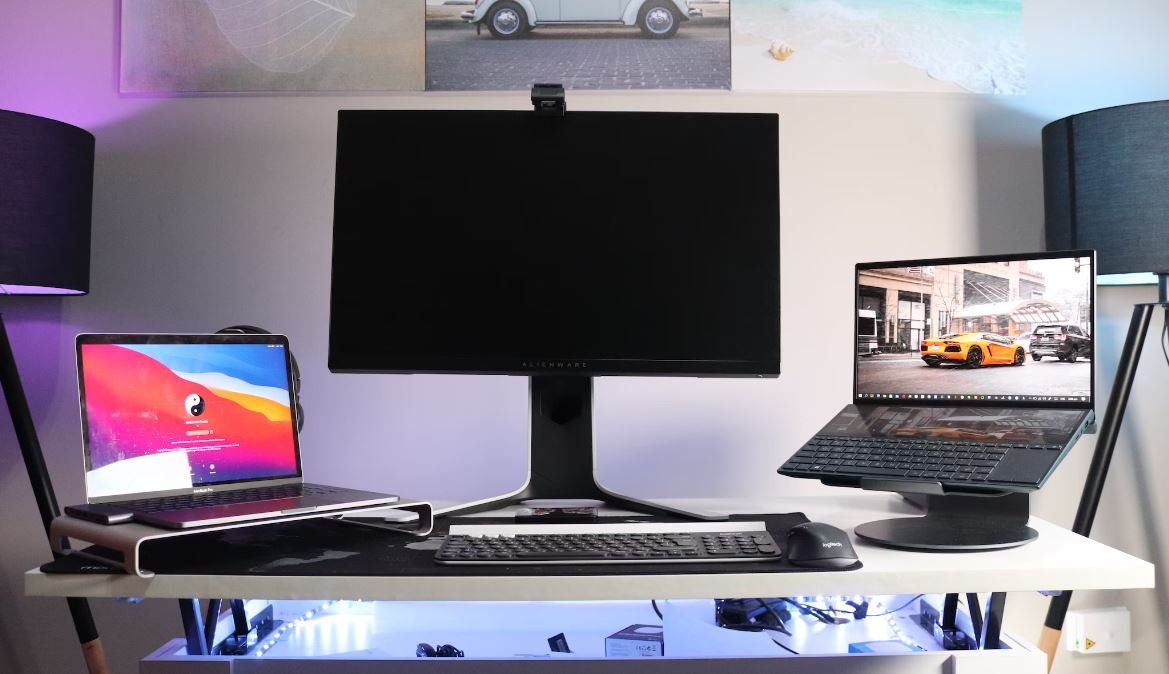Creating Podcast Show
Podcasts have become a popular and engaging medium for sharing information and entertainment. If you are interested in starting your own podcast show, this article will guide you through the necessary steps and provide valuable tips to ensure your podcast’s success.
Key Takeaways:
- Understand the purpose and target audience of your podcast.
- Invest in quality recording equipment and sound editing software.
- Create compelling content with a consistent release schedule.
- Promote your podcast through effective marketing strategies.
- Engage with your audience through listener feedback and guest appearances.
1. Define your Podcast’s Purpose and Target Audience
Before diving into the podcasting world, it is crucial to have a clear understanding of what your show will be about and who your target audience will be. *Identify a niche or topic that you are passionate about and knowledgeable in.* This will help you create content that resonates with your listeners.
2. Get the Right Equipment
To produce high-quality podcasts, you need to invest in good recording equipment and sound editing software. *Quality equipment ensures superior sound, enhancing the listening experience for your audience.* Consider purchasing a professional microphone, headphones, and a soundproof recording space.
3. Plan and Create Engaging Content
Successful podcasts have engaging content that keeps listeners coming back for more. *Plan your episodes in advance, establishing a consistent release schedule.* Create an outline or script and ensure your content is well-researched and structured. Incorporate storytelling, interviews, and discussions to make your podcast interesting and dynamic.
4. Promote Your Podcast
After creating your episodes, it’s time to promote your podcast to expand your audience. *Leverage social media platforms, such as Twitter or Instagram, to share teasers, episode highlights, and announcements.* Engage with your audience by responding to comments and encouraging them to share your content. Collaborate with other podcasters or influencers to broaden your reach.
5. Connect with Your Audience
Your listeners are the lifeblood of your podcast, so it’s essential to connect with them. *Encourage listener feedback and questions by providing contact information or creating a dedicated email address.* Consider having listener call-ins, interviews with experts, or fan episodes to involve your audience in the show’s content.
Interesting Statistics:
| Year | Number of Podcasts |
|---|---|
| 2018 | 550,000 |
| 2019 | 800,000 |
| 2020 | 1,500,000 |
6. Monetize Your Podcast
If you aim to monetize your podcast, explore various revenue streams such as sponsorships, advertising, merchandise sales, or crowdfunding platforms. *Build a strong and engaged audience to attract potential sponsors and advertisers.* Consider creating bonus content exclusively for your supporters to provide added value and increase monetization opportunities.
Interesting Facts:
- The first-ever podcast was created in 2003 by Adam Curry and Dave Winer.
- Over 50% of Americans aged 12 and older have listened to a podcast.
- Most podcast listeners are between the ages of 25 and 44.
7. Keep Evolving and Improving
The podcasting landscape is ever-changing, so it’s vital to stay up to date with trends and evolving technologies. *Regularly analyze your podcast’s performance and explore ways to improve sound quality, content structure, and audience engagement.* Adapt your podcast to meet your listeners’ needs and preferences.
8. Grow Your Network
Networking is key to expanding your podcast’s reach and connecting with other like-minded individuals. *Guest appearances on other podcasts or inviting guests to your show can help cross-promote each other’s content.* Attend podcasting conferences or join online communities and forums to engage with fellow podcasters and industry experts.
Why Podcasting Matters:
| Reasons | Percentage |
|---|---|
| Ability to multitask while listening | 82% |
| Podcasts provide a sense of empowerment and inspiration | 69% |
| Desire to learn new things | 58% |
With the right approach, dedication, and passion, you can create a successful and impactful podcast show. Remember, consistency in content, quality, and marketing efforts will contribute to reaching a wider audience and making a positive impact within your niche.

Common Misconceptions
1. Podcasting is expensive
Many people believe that creating a podcast show requires a significant financial investment. However, this is not necessarily true. While some podcasters may choose to invest in high-quality equipment or professional editing services, it is possible to start a podcast on a budget.
- There are free or low-cost recording and editing software options available
- Soundproofing your recording space can be done inexpensively with blankets or foam panels
- Tech-savvy individuals can design their own podcast website using free website builders or templates
2. You need to be an expert to start a podcast
Contrary to popular belief, you do not need to be a subject matter expert or have extensive experience to start a podcast. While having knowledge or expertise in the chosen topic can certainly be an advantage, anyone with a passion for a particular subject can start a podcast
- Research and preparation can help you become knowledgeable about the topic you want to discuss
- Guest interviews can bring in additional insights and expertise
- Sharing personal experiences and perspectives can add value to your podcast
3. Podcasting is a quick path to fame and fortune
Some individuals view podcasting as a surefire way to achieve instant fame and wealth. However, this is a misconception that can lead to disappointment. While it is possible for a podcast to gain a large following and generate revenue, it requires consistent effort and time.
- Building an audience takes time and consistent release of high-quality content
- Monetizing a podcast often involves strategies like sponsorships or advertising, which require negotiation and relationship building
- Growing a podcast community through social media and engagement is a long-term process
4. Podcasting is only for tech-savvy individuals
Many people believe that starting a podcast requires advanced technical skills or knowledge. However, with the availability of user-friendly tools and platforms, podcasting has become accessible to individuals of varying technical backgrounds.
- Podcast hosting platforms provide intuitive interfaces for uploading and managing podcast episodes
- Editing software often comes with simple user interfaces and tutorials
- Podcast directories make it easy to submit and distribute your podcast
5. All you need is a good idea
While having a good idea for your podcast is important, it is not the only factor that determines the success of your show. Execution, consistency, and engagement with your audience are crucial elements for building a successful podcast.
- Planning and structuring your episodes to deliver value and engage listeners
- Regularly releasing episodes and maintaining a consistent schedule
- Interacting with your audience through social media, emails, or live events

Choosing a Podcast Format
There are several podcast formats to consider when starting your own show. Each format offers unique benefits and suits different content types and goals. Here are some popular podcast formats and their characteristics:
| Format | Description |
|---|---|
| Interview | A host interviews guests on various topics, providing insights and expert opinions. |
| Solo | A single host presents the show, sharing personal experiences, thoughts, and advice. |
| Panel | A group of hosts engage in discussions and debates on specific subjects. |
| Storytelling | Narratives are woven into captivating stories, creating an immersive listening experience. |
Target Audience Demographics
Understanding your target audience is crucial for developing engaging podcast content. By knowing their demographics, you can tailor your episodes to appeal specifically to them. Here’s an overview of typical podcast listener demographics:
| Age Range | Gender | Education | Income |
|---|---|---|---|
| 18-24 | Male | College+ | $25,000-$49,999 |
| 25-34 | Female | College+ | $50,000-$74,999 |
| 35-44 | Other | College+ | $75,000-$99,999 |
| 45+ | Prefer Not to Disclose | Postgraduate | $100,000+ |
Podcast Equipment Recommendations
To produce high-quality audio for your podcast, you need the right equipment. Here are some recommended tools for podcasting:
| Item | Description | Price Range |
|---|---|---|
| Microphone | A high-quality microphone to capture clear and crisp audio. | $100-$500 |
| Headphones | Comfortable headphones for monitoring audio during recording and editing. | $50-$200 |
| Audio Interface | Enables you to connect microphones and headphones to your computer. | $100-$300 |
| Pop Filter | Reduces unwanted plosive sounds caused by strong consonants. | $10-$50 |
Podcast Hosting Platforms Comparison
Choosing the right hosting platform is essential to ensure your podcast reaches your target audience efficiently. Here’s a comparison of popular podcast hosting platforms:
| Platform | Price | Storage | Monetization |
|---|---|---|---|
| Anchor | Free | Unlimited | Yes |
| Libsyn | $5-$75/month | 50MB-$1500MB/month | Yes |
| Podbean | $9-$99/month | 100GB-Unlimited/month | Yes |
| Spreaker | $6-$45/month | 100GB-Unlimited/month | Yes |
Podcast Episode Lengths
Determining the ideal episode length is crucial to keep your audience engaged and avoid listener fatigue. Here are recommended episode lengths based on different content types:
| Content Type | Episode Length |
|---|---|
| News Updates | 10-15 minutes |
| Interviews | 30-60 minutes |
| Deep-Dive Topics | 45-90 minutes |
| Tutorials | 20-40 minutes |
Promoting Your Podcast
Once you’ve created compelling episodes, it’s essential to promote your podcast to reach a wider audience. Here are effective promotional strategies:
| Strategy | Benefits |
|---|---|
| Social Media Campaigns | Reach and engage with a large audience through targeted ads and posts. |
| Guest Appearances | Showcase your expertise on other podcasts or platforms to attract new listeners. |
| Email Newsletters | Build a loyal audience by offering subscribers exclusive content and updates. |
| Paid Advertising | Promote your podcast on various platforms to increase visibility and grow your listener base. |
Monetizing Your Podcast
Turning your passion for podcasting into a sustainable income stream is possible through various monetization methods. Here are some popular ways to monetize your podcast:
| Method | Advantages |
|---|---|
| Advertising | Earn revenue by featuring ads from sponsors during episodes. |
| Merchandise | Create and sell branded merchandise, such as t-shirts and mugs. |
| Donations | Invite listeners to support your show through one-time or recurring donations. |
| Patronage | Offer additional content or perks to loyal fans through a membership or subscription model. |
Podcast Analytics Metrics
Understanding your podcast analytics is essential for tracking the success and growth of your show. Here are key metrics to monitor:
| Metric | Description |
|---|---|
| Total Downloads | The overall number of times your podcast has been downloaded or streamed. |
| Subscriber Growth | The increase or decrease in your podcast’s subscriber base over a specific period. |
| Average Listening Duration | The average length of time listeners spend on your episodes. |
| Listener Demographics | Insights into the age, gender, location, and interests of your podcast listeners. |
Podcast Episode Release Schedule
Maintaining a consistent episode release schedule is crucial for attracting and retaining listeners. Here are recommended release frequencies based on podcast popularity:
| Podcast Popularity | Release Frequency |
|---|---|
| Weekly | For highly popular shows with a large listener base and dedicated following. |
| Bi-Weekly | For shows with a moderate listener base and a balance between quality and regularity. |
| Monthly | For niche shows with in-depth content that requires more time to develop. |
| Seasonal | For limited-series shows or shows with a specific theme or event-related content. |
Podcast Show Artwork Best Practices
Captivating artwork helps you make a great first impression and attract potential listeners. Consider these best practices when designing your podcast show artwork:
| Aspect Ratio | Color Scheme | Typography |
|---|---|---|
| 1:1 | Use eye-catching colors while ensuring readability. | Choose a bold and legible font that represents your podcast’s theme. |
| 3:2 | Incorporate relevant imagery or illustrations related to your podcast’s content. | Avoid overcrowding with excessive text or cluttered visuals. |
| 16:9 | Experiment with different design elements to make your artwork stand out. | Ensure your podcast’s name or logo is prominently displayed and easily identifiable. |
Creating a podcast can be an exciting and rewarding journey. By selecting the right format, understanding your target audience, utilizing quality equipment, and effectively promoting your episodes, you can build a successful show. Furthermore, considering monetization options, analyzing podcast metrics, maintaining a consistent release schedule, and designing appealing show artwork all contribute to a professional and engaging podcast. Keep exploring and refining your podcasting skills, and enjoy the thrilling experience of connecting with listeners through your unique audio content.
Frequently Asked Questions
How do I come up with a podcast show concept?
Creating a podcast show concept involves identifying your target audience, brainstorming unique and engaging ideas, and conducting market research to ensure there is demand for your chosen topic.
What equipment do I need to start podcasting?
Basic podcasting equipment includes a microphone, headphones, a computer or laptop, audio editing software, and a reliable internet connection. Additional equipment like a sound mixer or a pop filter can also enhance audio quality.
How do I record and edit my podcast episodes?
To record your podcast, you can use software such as Audacity or GarageBand, which allow you to capture audio from your microphone. Editing can be done using these software tools as well, enabling you to cut out any mistakes, add music, and improve overall sound quality.
Where should I host my podcast?
There are several podcast hosting platforms available, such as Libsyn, Podbean, and Buzzsprout. These platforms store your podcast files and generate an RSS feed that allows your show to be published and distributed to various podcast directories.
How can I promote my podcast?
Promoting your podcast involves utilizing various channels, such as social media platforms, your website or blog, guest appearances on other podcasts, and reaching out to influencers or relevant communities. Creating engaging cover art and optimizing your show’s description and title can also help attract listeners.
Should I script my podcast episodes?
Scripting your episodes can provide structure and prevent rambling, especially if you’re just starting out. However, some podcasters prefer a more conversational approach with bullet points or an outline to keep the content natural and spontaneous.
How often should I release new episodes?
Consistency is key when releasing podcast episodes. It’s recommended to establish a regular schedule that suits your production capabilities and audience expectations. Whether it’s weekly, bi-weekly, or monthly, maintaining a consistent release frequency helps retain and grow your listener base.
What are some monetization strategies for my podcast?
Monetizing your podcast can be achieved through sponsorships, paid advertisements, merchandise sales, Patreon subscriptions, and crowdfunding platforms. Building a loyal audience and engaging with them can attract potential advertisers and supporters.
How can I improve the audio quality of my podcast?
To improve audio quality, you can reduce background noise by recording in a quiet environment, use a high-quality microphone, apply post-production effects like noise reduction and equalization, and ensure proper levels and audio balance during editing.
What are some podcasting best practices?
Some best practices for podcasting include creating engaging and valuable content, using clear and concise episode titles, providing show notes or transcripts, optimizing your podcast for search engines, encouraging listener interactions and feedback, and continuously refining your skills through self-assessment and feedback from your audience.


Leave a Reply